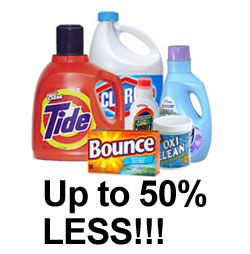Want to save money, reduce your energy consumption, and cut your dependency on foreign oil?
The independent testing firm Scientific Services S/D of New York recently completed two studies that compared energy requirements and detergent requirements with hard water vs. soft water.
The effect water softeners have on common household appliances’ cleaning ability is nothing short of amazing:
Washing Machines
With soft water, the same or better stain removal and whiter clothes can be achieved by using 50% less laundry detergent. Energy can also be saved by washing in 60 degree F cold water instead of 100 degree F hot water.
Dishwashers
Dishwasher detergent can be reduced by more than 50% after softening and still get the same cleaning results.
This is great news for both households and restaurants. Let’s take a look at what hard water is, and why you can get such a dramatic improvement when you soften it!
What is Hard Water?
Water Hardness is calculated by the concentration of Calcium and Magnesium ions in water. These ions are leached from aquifers that contain rock such as calcite, gypsum, and dolomite.
The total amount of Calcium and Magnesium is measured as Grains per Gallon (gpg)
Water Hardness Scale
| 10gpg+ | Extremely Hard |
| 7 – 10gpg | Very Hard |
| 3.5 – 7gpg | Hard |
| 1 – 3.5gpg | Moderately Hard |
| 0 – 1gpg | Soft Water |
The average hardness level in the United States is 5gpg. While this is classified as hard water, it fails in comparison to most water in Minnesota.
Water hardness levels in the Twin Cities can range from 12gpg all the way up to a whopping 30gpg!
In sharp contrast, rainwater is naturally soft as it contains 0gpg of hard water ions.
Soap Scum and Hard Water Stains
Soap is much less effective in hard water because its reacts with hardness to form the calcium or magnesium salt of the organic acid of the soap. These salts are insoluble and form a solid precipitate (soap scum), instead of producing lather.
Effectively washing dishes in hard water is almost impossible.
When dishwashers spray glassware with hard water, it has a sandblasting effect that permanently etches and scratches the glass. Etching starts out with a rainbow-like color, and eventually turns into what looks like a white film. Add soap scum residue to etched glassware, and you have a real mess!
When soap scum builds up in fabric it begins to attract dirt and lint. Over time, whites begin to take on a yellow-gray color, and dark colors begin to fade. Fabric that was once soft and smooth gradually becomes brittle and scratchy feeling.
Hard Water Effects on Dishwashers

The dishwasher study included tests that removed difficult soils, in addition to evaluating spotting and filming.
In dishwashers, the relationship between detergent and hardness was investigated with two consecutive wash-dry cycles for spot and film. One detergent was evaluated for five cycles to ensure that effects do not change with increased number of cycles.
Researchers found that using almost 30% less detergent with softened water could clean as well as water with a 10gpg hardness level. At 25gpg, detergent savings rose to 70% with softened water!
The study also states that air drying provides better results with softened water instead of hard water. This could be used as another way to save electrical energy with soft water.
Hard Water Effects on Laundry

Researchers used varying levels of hardness and several different name brand detergents in washing machines. Significant savings were noted for all levels of hardness, even as low as 5 grains per gallon!
The laundry study examined stain removal by using half of manufacturers’ recommended detergent levels. Water hardness samples ranged from 0-30 gpg, and wash temperatures were tested at 60, 80 and 100 degree F.
It was found that soft water is better at removing stains than increased water temperature or more detergent being used.
Notably, softened water with the least amount of detergent and lowest temperature actually provide a higher degree of whiteness compared to increased hardness and both high temperature and large amounts of detergent. This was found to be true for all stains and all the detergents tested.
Summary
Water Softeners can reduce reliance on polluting fuels because of energy savings and help cut back on harmful detergents going into water streams. So this means you can enjoy cleaner clothes and dishes along with:
- Fewer detergents and chemicals discharged into the environment
- Lower energy requirements to heat water
- Less oil used to make the plastic detergent bottles
- Sounds like a good deal to us.
Who We Are
Premier Water is a local, family-owned water treatment company based in Chanhassen, MN. Since 1978, Premier Water has successfully installed and serviced 1000’s of Residential and Commercial Water Softeners. We offer a FREE WATER TEST to gather information and help our clients with the right solution for their needs. We can also be reached at (952) 479-4553 for more information.


Trackbacks/Pingbacks